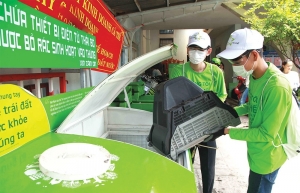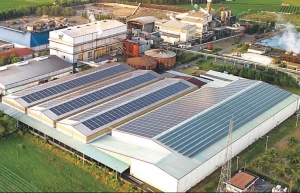Obstructions bemoaned in treating industrial waste
Chu Duc Tam, vice president of the board at SM Tech Vina Engineering in Trang Due Industrial Park (IP), has faced difficulties in treating industrial waste. This is creating barriers to establishing cooperative relationships for the company, based in the northern city of Haiphong.
 |
| Obstructions bemoaned in treating industrial waste, illustration photo/ Source: freepik.com |
“During the production process, the company needs to discharge a large volume of wasted lubricant oil and then has to hire the environment treatment company to collect and treat this product. However, we know that many manufacturers need this wasted lubricants, but SM Tech Vina can’t sell this product to them. Under the existing regulation, we have to pay VAT for this business activity and the transport fee is costly,” Tam said.
The total fee for tax and transport is much more expensive than the fee to hire the third party to deal the wasted lubricants, Tam added.
“This wastes the material, which could be reused to save costs for tenants in IPs. In addition, it is also a hurdle to creating an industrial symbiotic relationship between tenants to develop eco-IPs,” Tam said.
Many manufacturers in IPs said they are facing obstructions in reselling unused scrap. For example, if the enterprise imports one million scrap products, but due to the change of market demand, they must change its production plan, and then have to resell or re-export the remaining scrap.
“It is very complicated to resell unused products in the Vietnamese market because you must pay import-export tax and VAT before reselling the unused products,” said Bui Van Thanh, director of New Sun Law Group.
Tam pointed out that such measures are supposed to be productive.
“The model of reselling and exchanging waste in IPs is considered industrial symbiosis, contributing to cost savings and reduced resource use by jointly maximising the output that can be produced, thereby providing economic and environmental benefits,” Tam said. “Industrial symbiosis helps increase profits and competitiveness, creating opportunities for companies at present - both private and public. It follows that it brings significant benefits to the environment by reducing the need for materials and waste.”
There are several types of industrial symbiosis, including sharing infrastructure facilities (energy and water); providing coworking locations; exchange of waste and by-products; sharing services and activities between businesses; and forming connections, utilising, and sharing resources and infrastructure of an IP with neighbouring residents, thereby creating jobs and opportunities for cooperation.
Explaining the reasons for tightening the exchange of waste water, a representative from the United Nations Industrial Development Organization (UNIDO) said there is a sufficient basis to implement solid waste management in IPs, but several issues get in the way.
“Small- and medium-sized enterprises (SMEs), especially domestic ones, often violate regulations on waste classification and the storage and treatment of hazardous wastes,” the representative said.
According to him, SMEs also frequently bypass controls at the final disposal, delegating control entirely to the waste collection unit, and keeping inaccurate records of waste statistics. IPs, meanwhile, fail to acknowledge the waste content of enterprises and often lack internal waste treatment companies.
“These issues are a major barrier to promoting recycling and reuse in enterprises, and industrial symbiosis in IPs,” the representative said.
UNIDO currently supports some IP developers and tenants to implement pilot industrial symbiosis. At the DEEP C IP in Haiphong, for instance, steel scrap is collected from companies in the park, and waste plastic is also collected and provided to a plastics factory.
DEEP C has also developed a shared web platform, and provides focused training for businesses in the park, including on legal regulations and the environment. The park also tries to develop shared services, such as laundry, maintenance, meals, security, and fire prevention.
 | Businesses to tackle waste recycling model There are only three months left for various producers and importers to come to terms with a new waste recycling regulation overhaul. |
 | Pricing switch up ahead for solid waste and biomass The Ministry of Industry and Trade is to publish a new pricing framework applicable to refuse and biomass power plants, with a possibility that Vietnam Electricity will negotiate the purchase price using this framework. |
What the stars mean:
★ Poor ★ ★ Promising ★★★ Good ★★★★ Very good ★★★★★ Exceptional
Related Contents
Latest News
More News
- A golden time to shine within ASEAN (February 19, 2026 | 20:22)
- Vietnam’s pivotal year for advancing sustainability (February 19, 2026 | 08:44)
- Strengthening the core role of industry and trade (February 19, 2026 | 08:35)
- Future orientations for healthcare improvements (February 19, 2026 | 08:29)
- Infrastructure orientations suitable for a new chapter (February 19, 2026 | 08:15)
- Innovation breakthroughs that can elevate the nation (February 19, 2026 | 08:08)
- ABB Robotics hosts SOMA Value Provider Conference in Vietnam (February 19, 2026 | 08:00)
- Entire financial sector steps firmly into a new spring (February 17, 2026 | 13:40)
- Digital security fundamental for better and faster decision-making (February 13, 2026 | 10:50)
- Aircraft makers urge out-the-box thinking (February 13, 2026 | 10:39)

 Tag:
Tag:

















 Mobile Version
Mobile Version